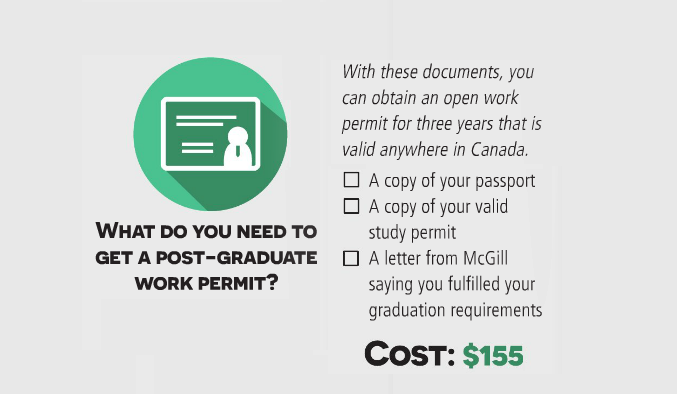For graduating students, the haunting question “what are you doing after McGill” follows us wherever we go. But for international students, post-graduation plans are complicated by a further question—“can I even stay in Canada?”
Graduating international students can stay in Canada if they apply for a post-graduate work permit—the length of which can vary. If your program was over two years long, your permit can last up to three years; if your program was under two years, the duration of the permit will last as long as the program.
The permit costs $155, and allows international students to work anywhere in Canada even if you don’t have a job lined up when you apply. You’re also allowed to leave and return to the country throughout the duration of the permit.
To apply, students need to submit a copy of their passport, a copy of their valid study permit, and a letter from McGill confirming the completion of all degree requirements. There’s no language component to the application.
According to Corrie Bertone, international student advisor at McGill’s International Student Services, most students can apply for the permit online. Processing times vary, but Immigration Canada updates estimated times weekly online. However, students from “exempt countries,” which do not require entry visas, can go to the Canada-U.S. countries border crossing and receive one within a day. Among these are Australia, Japan, Korea, New Zealand, Singapore, the United States, and most European countries.
Bertone says there’s one type of person she advises against getting a post-graduate work permit: those who plan to continue their studies in the next three years.
“This post grad-work permit is a once in a lifetime opportunity,” she says. “As soon as you submit an application for [the permit] and you obtain it, that’s it. You have it for three years. Should you decide to go to school next January, you can’t say to Immigration Canada, ‘Oh, put a hold on my work permit, I’m not using it anymore.’”
Because the permit can only be granted once, if a student were to decide to do a master’s degree in a year or two, he or she would not be able to reapply for a new permit afterwards. While other work permits are available, they often require you to have a job lined up and take longer to process.
“You can only get it once,” Bertone emphasizes. “That’s very important to keep in mind if somebody’s intention is to go back to school. It happens—sometimes students don’t get into their program, or they’re not quite sure of what to do, and they change their mind.”
Students can apply for the permit beginning on graduation day and only for the following 90 days, so it’s best to start early if you’re planning on getting a permit. Remember—you need a valid study permit at the time of your application, so even if your permit extends beyond 90 days after graduation, you still have to apply within that time frame.
“Even if your plan is not to remain in Canada but you find a good job offer, it’s a contract for a couple of years—it’s good experience and good money,” Bertone says. “But if somebody’s intention is to stay here, they can use this time that they’re working post-grad to hop on their future. It’s become a very good opportunity.”










excellent submit, very informative. I wonder why the other experts of this sector do not understand this.
You must proceed your writing. I am confident, you’ve a great readers’ base
already!
Admiring the dedication you put into your site and detailed information you offer.
It’s good to come across a blog every once in a while that isn’t the same outdated rehashed
information. Fantastic read! I’ve bookmarked your site
and I’m adding your RSS feeds to my Google account.